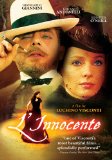| Reviews & Columns |
|
Reviews DVD TV on DVD Blu-ray 4K UHD International DVDs In Theaters Reviews by Studio Video Games Features Collector Series DVDs Easter Egg Database Interviews DVD Talk Radio Feature Articles Columns Anime Talk DVD Savant Horror DVDs The M.O.D. Squad Art House HD Talk Silent DVD
|
DVD Talk Forum |
|
|
| Resources |
|
DVD Price Search Customer Service #'s RCE Info Links |
|
Columns
|
|
|
L'Innocente
THE MOVIE:
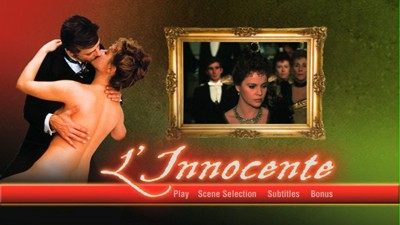
For his final film, famed Italian director Luchino Visconti turned to the work of influential and controversial novelist Gabrielle d'Annunzio. The author came to fame at the turn of the 20th Century, and in addition to his literary works, he wrote the scenario for the classic Italian silent film Cabiria. His literary legacy, however, has long been overshadowed by his involvement in the early stages of the Fascist party, and this has prevented his books from ever fully coming back into fashion. I'll admit to not being familiar with his work, but I also can't claim to be any kind of expert on Italian literature. With just a very basic amount of research, though, it became quickly evident that in terms of thematic concerns, Visconti and d'Annunzio appear to be kindred spirits. Both had aristocratic origins that preceded their artistic endeavors, and both were fascinated with Italian society as it no longer was, reaching back into history to root through the peccadilloes of the past in order to shed light upon the present.
Visconti's 1976 adaptation of L'Innocente is an involving romantic tangle. Plot-wise, it could almost be an adaptation of Danielle Steele rather than of an 1892 novel. The story involves a Don Juan of the wealthy uppercrust and his wife and mistress and the complications that arise due to enflamed desire. Tullio (Giancarlo Giannini, most recently seen in the Daniel Craig installments of the James Bond series) is a well-to-do lothario married to Giuliana (Laura Antonelli), a beautiful and understanding woman who is willing to allow her husband his philandering as long as he doesn't rub it in her face. Lines like that have little meaning for a selfish man like Tullio, however, and though he chases his mistress, Countess Teresa Raffo (Jennifer O'Neill), away from the concert he is attending with his wife--and by that I mean he actually chases her, following her to a rendezvous--he thinks nothing of detailing his weakness for this other woman to Giuliana. Of course, when the neglected woman goes looking elsewhere and strikes up an affair with the dashing writer Filippo d'Arborio (Marc Porel), Tullio wants what the other man is having despite any previous renunciation of it. He's a classic case. When Teresa wants to throw him over, he can't live without her; when another man has designs on his wife, he suddenly remembers the gorgeous woman he first married.
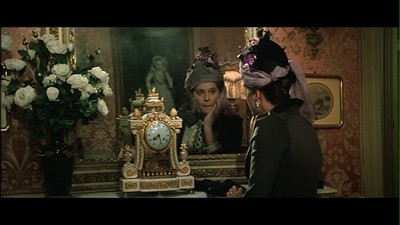
What makes L'Innocente different than your average Lifetime steamer are the advantages of the period style and the social conventions of Italian high society. The clash of masculinity between Tullio and Filippo takes place not just in the appointments on their party calendars, but also on the fencing match. Put a sword in Tullio's hand, and suddenly the reservations of polite society dissolve. One also has to wonder if the catty remarks he makes about Filippo's writing style are playful jabs at d'Annunzio's own florid prose. What an insult it must be to be both poetic and didactic! Visconti matches these haughty displays with his usual sense of austerity. The lavish costumes, the colorful sets--his movies lean toward the more outrageous end of the opulent costume drama, but as with many Italian films of a similar subject, there is always a sense of rot underneath. The garish decorations have an air of decay about them, a fragility that makes them appear as if they will soon pass. In regards to the summer home that Tullio and Giuliana never use, Tullio's mother (Rina Morelli) says that a house that isn't lived in falls apart faster than the one that has regular inhabitants. It's the curse of the unattended marriage, as well as that of the unattended life--the trappings don't matter if you're always running off in pursuit of something else.
From those two central affairs and the other rivalries that surround them, further complications rise. Tullio can't continue to so consistently tread across the hearts of others to go after the things he wants for himself. Self-involvement gives way to a lack of impulse control, and a pregnancy puts Tullio on a moral path that proves treacherous to those around him. Ultimately, however, as the consummate control freak, the treachery is against himself, and he will have to prove to everyone that he can take control again.
There are elements to L'Innocente that make it a sort of companion to Visconti's epic The Leopard. In that earlier film, Burt Lancaster played an ancient patriarch losing his way in a world that was moving past him, a man of a different age entering the next one after it's already too late. In contrast, Tullio, a self-avowed atheist, is a modern man in a world that hasn't yet caught up with him. Of course, that would require us to accept that he is an enlightened moralist rather than a do-as-you-please nihilist. If one wanted to align the film with Gabrielle d'Annunzio's politics, than Tullio is the example of a man who has forsaken order and law for personal gain, and he is left with nothing but the emptiness of self. Well, I might accept the consequence of that fascist theory, but not the cause. I personally tend to read things more existentially. Tullio has created a code of conduct that he can't follow, one that denies certain fundamental aspects of the human condition. He has tried to browbeat his inner emotional self into complying with a way of living where he gets the most toys but little satisfaction.
Either way, L'Innocente puts a snug lid on Luchino Visconti's film career. As an artist who was fascinated by characters who were responsible for their own undoing and the sticky briar patch of human relationships and social mores, he couldn't have chosen a more succinct, more hot-blooded tale to say his good-byes with.
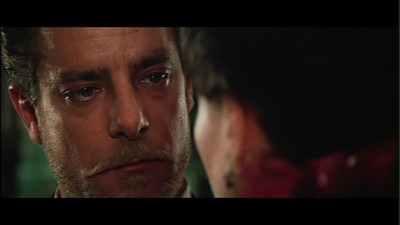
THE DVD
Video:
The film, shot at 2.35:1, is given a 16X9 anamorphic transfer for DVD. The overall picture quality is inconsistent. Sometimes the colors are ratcheted up, while other scenes look grainy and faded. There isn't a lot of comprehensive print damage, but there are regular instances of dirt and scratches. As far as clean-ups go, it's about halfway there, but not nearly on par with other Visconti restoration jobs, such as the aforementioned The Leopard. As far as digital transfers, it's got a few more problems. The layer shift in chapter 11 is easily ignored, but do be prepared for some tracer lines around the edges of the figures on screen. The overall resolution tends to lean toward the soft side.
Sound:
There is a slightly tinny quality to the Dolby Digital mix, but that could also be somewhat blamed on the odd audio of most Italian cinema. The soundtrack was otherwise clean and of a clear quality.
Optional English subtitles appear on screen in yellow and they are evenly paced and easy to read. There were multiple grammar errors throughout that will bug you if you're a nerd like me, but they aren't so bad as to destroy the meaning of what is being said or otherwise ruin your viewing.
Extras:
Carlo Lizzani sits down with Suso Cecchi d'Amico, one of the three screenwriters on the project, as well as a regular Visconti collaborator. Shot for Italian television, the video program runs just under 1 hour and 20 minutes, and it covers all of d'Amico's career with Visconti in a frank and exhaustive manner.
A text description of the recent Koch-Lorber release of Visconti's Ludwig is also included on the DVD.
FINAL THOUGHTS:
Another calculated and sophisticated tale of hypocritical aristocracy from Luchino Visconti, the 1976 film L'Innocente ends up finishing out the late director's career in a manner that plays to his strengths. At once bold and restrained, hot blooded in the bedroom but cold blooded everywhere else, L'Innocente is a steamy tale of passion and denial. It displays the director's mannered style and love of opulent detail, and also has excellent performances from Giancarlo Giannini, Laura Antonelli, and Jennifer O'Neill. The DVD of L'Innocente is not really up to snuff, but it will pass for now. Recommended.
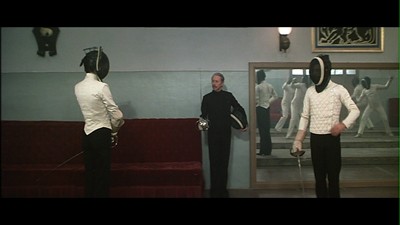
Jamie S. Rich is a novelist and comic book writer. He is best known for his collaborations with Joelle Jones, including the hardboiled crime comic book You Have Killed Me, the challenging romance 12 Reasons Why I Love Her, and the 2007 prose novel Have You Seen the Horizon Lately?, for which Jones did the cover. All three were published by Oni Press. His most recent projects include the futuristic romance A Boy and a Girl with Natalie Nourigat; Archer Coe and the Thousand Natural Shocks, a loopy crime tale drawn by Dan Christensen; and the horror miniseries Madame Frankenstein, a collaboration with Megan Levens. Follow Rich's blog at Confessions123.com.
|
| Popular Reviews |
| Sponsored Links |
|
|
| Sponsored Links |
|
|
| Release List | Reviews | Shop | Newsletter | Forum | DVD Giveaways | Blu-Ray | Advertise |
|
Copyright 2024 DVDTalk.com All Rights Reserved. Legal Info, Privacy Policy, Terms of Use,
Manage Preferences,
Your Privacy Choices | |||||||









